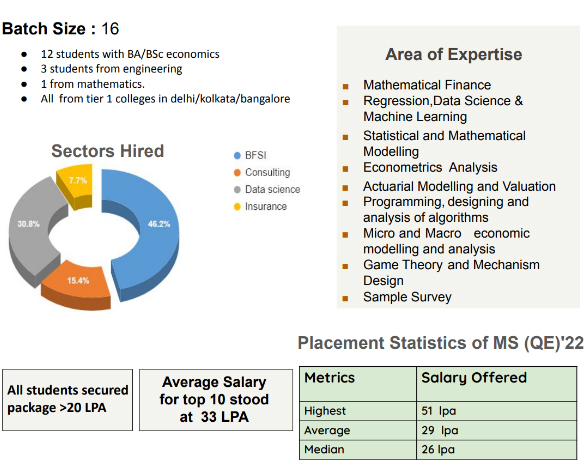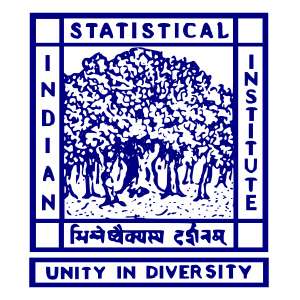Master's Programme at Indian Statistical Institute
The Indian Statistical Institute (ISI) offers the 2 years Master of Science in Quantitative Economics (MSQE) program, catering to ma economics entrance exam syllabus. The ISI-MSQE program places a special emphasis on quantitative methods, aligning with preparation for MA Economics entrance. Graduates of this program will be well-prepared for a career in academia or for assuming pivotal roles in various private and public sector organizations. The MSQE program is available at both the Kolkata and Delhi campuses of ISI, offering ma economics entrance coaching at prime locations.
ISI MSQE Admission Procedure
The admission assessments will include a series of multiple-choice and short-answer questions that cover topics in Economics and Mathematics at the undergraduate level. Upon successful completion of the written test, candidates will proceed to the next phase, which involves a personal interview as part of the selection process.
Click here https://www.isical.ac.in/
Number of Seats for ISI MSQE in Delhi and Kolkata
Delhi campus offers a total of 35 seats, with 13 for General category, 9 for OBC-NCL, 5 for SC, 3 for ST, 3 for EWS, and 2 for General (PwD).
Meanwhile, Kolkata campus has 21 seats, including 8 for General, 6 for OBC-NCL, 3 for SC, 1 for ST, 2 for EWS, and 1 for General (PwD)
ISI MSQE Past Year Papers
ISI MSQE Eligibility Criteria
To qualify for enrollment in Master of Science in Quantitative Economics (MSQE) program offered by the renowned Indian Statistical Institute (ISI), prospective candidates must hold a Bachelor’s degree with a duration of three years or more, in any field of study. Besides this requirement no other criteria is mentioned on the college website.

ISI MSQE Fee Structure
The Institute does not levy any fees for this program. Instead, students are provided with a monthly stipend of ₹8000/-.
ISI Merit List Students 2021, 2022 & 2023 from EduSure
Souvik Mahato
Rithwik Jaiswal
Raunak Chatterjee
Sarvesh Choushetti
Moulik Bhattacharya
N Soumik
V Gaurav
Agrim Rana
Abhiram Lokanathan
Charvi Dhruve
Ishaan Sengupta
Namisha Sharma
Smriti Karan
Yash Rawat
Sahil Bagdi
Apoorv Khatri
Krish Sharma
Anamitra Bhattacharya
Kinger Dev Singh
Piyasa Das
Sifat Kumar Cheema
Debarka Patra
Varun Mehta
Pratyush Raychaudhuri
Kabir Chatterjee
Rahul Dev Singh
Pranjal Das
Iman Kundu
Anushka Das
Ritashree De
Abhishek Guin
Sagar Mujumdar
Shantanu Chatterjee
Abhishek Parida (Eco Masters)
Abhishek Pankaj
Asmita Raychaudhuri
Sumedha Ghosh
Sanyam Gupta
Aditya Bikram Nayak
Kashish Tibrewal
Rajat Jain
Rishabh Gupta
Aditi Tiwari
Noopor Datar
ISI MSQE Entrance Exam Syllabus
Mathematics Syllabus:
Algebra: This section encompasses the Binomial Theorem, Arithmetic Progressions (AP), Geometric Progressions (GP), Series, Permutations and Combinations, and the Theory of Polynomial Equations.
Linear Algebra: Topics include Vector Spaces, Linear Transformations, Matrix Representations along with Elementary Operations, and Systems of Linear Equations.
Calculus: This portion covers Functions, Limits, Continuity, Differentiation of Functions involving one or more variables, Unconstrained Optimization, Definite and Indefinite Integrals, Integration Techniques such as Integration by Parts and Substitution, concepts of Convexity and Quasi-convexity, Constrained Optimization for Functions with not more than two variables, Implicit Function Theorem, and Homogeneous and Homothetic Functions.
Elementary Statistics: This part delves into Elementary Probability Theory, Measures of Central Tendency, Dispersion, Correlation and Regression Analysis, Probability Distributions, and familiar Standard Distributions such as Binomial and Normal.
Microeconomics Syllabus:
Topics in Microeconomics encompass the Theory of Consumer Behavior, Theory of Production, Market Structures in the context of Perfect Competition and Monopoly, Price Discrimination, Duopoly with Cournot and Bertrand Competition, Public Goods, Externalities, General Equilibrium, and Welfare Economics.
Macroeconomics Syllabus:
Macroeconomics subjects include National Income Accounting, the Simple Keynesian Model for Income Determination and the Multiplier, the IS-LM Model, Models of Aggregate Demand and Aggregate Supply, Money and Banking Principles, Inflation, the Phillips Curve, Elementary Open Economy Macroeconomics, the Harrod-Domar Model, and the Solow Model.
ISI MSQE Entrance Exam Paper Pattern
The written test is divided into two sections (2 hours each), PEA and PEB. PEA includes Multiple-Choice Questions (MCQs) related to Mathematics and Economics at the undergraduate level. PEA is conducted in forenoon. On the other hand, PEB which is conducted in afternoon comprises Descriptive Questions in Mathematics and Economics, also at the undergraduate level.
ISI MSQE Placements
Graduates have been recruited across various sectors including BFSI, Data Science, Consulting, and Insurance. The average salary for the top 10 students reached an impressive 33 LPA, with all students securing packages exceeding 20 LPA. The highest package offered was 51 LPA. Past recruiters include renowned organizations such as JP Morgan, Morgan Stanley, EY, Deloitte, PwC, KPMG, Goldman Sachs, Barclays, Accenture, Aditya Birla, Citi Bank, McKinsey, and many others. Source: ISI Placement Brochure

Be the next one to be placed!
ISI MSQE Entrance Exam Marking Scheme
The question paper of ISI Admission Test is divided into 2 sections. Section A consists of Multiple Choice/ Descriptive Questions of 30 marks, whereas Section B consists of Short Answer Questions 70 marks. Candidates need to qualify for both sections.



